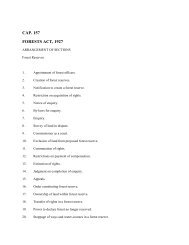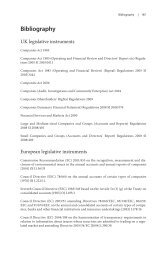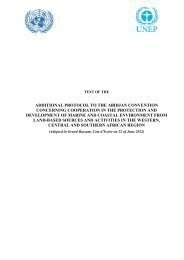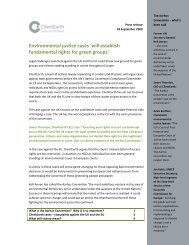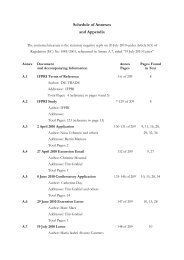134 | <strong>Environmental</strong> <strong>and</strong> <strong>social</strong> <strong>transparency</strong> <strong>under</strong> <strong>the</strong> Companies Act 2006Annex 6: UK law governing company AGMs | 135As seen in <strong>the</strong> main body of this review, <strong>the</strong> annual accounts <strong>and</strong> reportsare laid before <strong>the</strong> shareholders at <strong>the</strong> AGM, <strong>and</strong> discussion at <strong>the</strong> AGMconstitutes a key element in <strong>the</strong> reporting process. The AGM provides animportant opportunity for scrutiny <strong>and</strong> questioning, to ensure that <strong>the</strong>company directors are appropriately recognizing, reporting <strong>and</strong> managingissues relating to <strong>the</strong> business of <strong>the</strong> company, including environmental<strong>and</strong> <strong>social</strong> matters.The rules for <strong>the</strong> running <strong>and</strong> regulation of any individual company’sinternal affairs are held in <strong>the</strong> company’s ‘articles of association’. Historically,companies have to a great extent been allowed to manage <strong>and</strong>regulate <strong>the</strong>ir internal affairs. 337 The role of company law in internalcorporate governance is to set baselines <strong>and</strong> a framework of acceptableinternal company practice. This is what <strong>the</strong> Companies Act 2006 does inrelation to AGMs.The provisions of <strong>the</strong> Companies Act 2006 which relate to meetings <strong>and</strong>resolutions came into force in October 2007. 338The Companies Act 2006 has since been amended <strong>and</strong> supplemented by<strong>the</strong> Companies (Shareholders’ Rights) Regulations 2009 (‘<strong>the</strong> Shareholders’Rights Regulations’), which make a number of changes to <strong>the</strong> lawregarding company general meetings, effective as of 3 August 2009. 339Legislative quotation of <strong>the</strong> Companies Act 2006 below has been amendedaccordingly.‘Traded’ companiesA new definition introduced by <strong>the</strong> Shareholders’ Rights Regulations wasthat of a ‘traded company’, to which many of <strong>the</strong> new requirements apply.s360C. Meaning of “traded company”In this Part, “traded company” means a company any shares of which—(a) carry rights to vote at general meetings, <strong>and</strong>(b) are admitted to trading on a regulated market in an EEA State by or with<strong>the</strong> consent of <strong>the</strong> company.‘Traded’ companies are those with shares voluntarily traded on any regulatedmarket in <strong>the</strong> European Economic Area (EEA). This includes <strong>the</strong>London Stock Exchange, as well as <strong>the</strong> PLUS-listed market <strong>and</strong> manymore. 340 It does not include <strong>the</strong> Alternative Investment Market (AIM).A.6.1Requirement to hold an AGMs336 Public companies: annual general meeting(1) Every public company must hold a general meeting as its annual general meetingin each period of 6 months beginning with <strong>the</strong> day following its accounting referencedate (in addition to any o<strong>the</strong>r meetings held during that period).s307A. Notice required of general meeting: certain meetings of traded companies(1) A general meeting of a traded company must be called by notice of—(a) in a case where conditions A to C (set out below) are met, at least 14 days;(b) in any o<strong>the</strong>r case, at least 21 days.(2) Condition A is that <strong>the</strong> general meeting is not an annual general meeting.Public companies must hold an AGM within 6 months of <strong>the</strong> end of <strong>the</strong>company’s financial year. A minimum of 21 days notice must be given tothose who have a right to notice.Many of <strong>the</strong> legal provisions relating to AGMs also apply to o<strong>the</strong>r company‘general meetings’. However, for <strong>the</strong> purposes of this review, reference willbe made to <strong>the</strong> specific context of AGMs.A.6.2Discussion of environmental <strong>and</strong> <strong>social</strong> matters atcompany AGMsThere are a number of opportunities at company AGMs for <strong>the</strong> discussionof environmental <strong>and</strong> <strong>social</strong> matters related to <strong>the</strong> business of <strong>the</strong>company.A.6.2.1Annual ReportingAs seen elsewhere in this review, UK companies are required to prepareannual accounts to give a true <strong>and</strong> fair view of <strong>the</strong> assets, liabilities, financialposition <strong>and</strong> profit or loss of <strong>the</strong> company, 341 <strong>and</strong> an annual directors’report to provide a range of contextual information.s437 Public companies: laying of accounts <strong>and</strong> reports before general meeting(1) The directors of a public company must lay before <strong>the</strong> company in general meetingcopies of its annual accounts <strong>and</strong> reports.(2) This section must be complied with not later than <strong>the</strong> end of <strong>the</strong> period for filing<strong>the</strong> accounts <strong>and</strong> reports in question.(3) In <strong>the</strong> Companies Acts “accounts meeting”, in relation to a public company,
136 | <strong>Environmental</strong> <strong>and</strong> <strong>social</strong> <strong>transparency</strong> <strong>under</strong> <strong>the</strong> Companies Act 2006Annex 6: UK law governing company AGMs | 137means a general meeting of <strong>the</strong> company at which <strong>the</strong> company’s annual accounts<strong>and</strong> reports are (or are to be) laid in accordance with this section.The Companies Act 2006 requires that <strong>the</strong> annual accounts <strong>and</strong> reportsmust be ‘laid’ before <strong>the</strong> company in general meeting, which in practicewill be <strong>the</strong> AGM. There is no legal requirement that <strong>the</strong> annual reportsneed <strong>the</strong> shareholders’ approval or acceptance. Shareholders have no legalright to reject <strong>the</strong>m. 342 Fur<strong>the</strong>rmore, <strong>the</strong>re is no explicit provision in lawor guidance as to what <strong>the</strong> process of ‘laying’ <strong>the</strong> reports involves; whe<strong>the</strong>r<strong>the</strong>re must be <strong>the</strong> opportunity for specific discussion of <strong>the</strong> accounts orreports. However, in practice <strong>the</strong>re will always be <strong>the</strong> opportunity fordiscussion of <strong>the</strong> reports at <strong>the</strong> AGM.As discussed in <strong>the</strong> main body of this review, <strong>the</strong> AGM constitutes oneof <strong>the</strong> key opportunities for <strong>the</strong> annual accounts <strong>and</strong> reports prepared bycompany directors to be scrutinized, <strong>and</strong> <strong>the</strong> main opportunity for shareholdersto ask questions to clarify <strong>and</strong> ensure <strong>the</strong> accuracy <strong>and</strong> proprietyof reporting. This is extremely important for <strong>the</strong> proper internal workingsof <strong>the</strong> company. It is needed to ensure <strong>transparency</strong> between directors<strong>and</strong> shareholders, to encourage shareholders to be engaged <strong>and</strong> informed,<strong>and</strong> to provide <strong>the</strong> opportunity for shareholders to exercise control over<strong>the</strong>ir investment <strong>and</strong> <strong>the</strong> future of <strong>the</strong> company.A.6.2.2 ResolutionsAt AGMs, resolutions are put to <strong>the</strong> shareholders for voting, on all mannerof company activities. Resolutions provide an opportunity for environmental<strong>and</strong> <strong>social</strong> matters associated with a company’s activities to bediscussed at <strong>the</strong> AGM. 343s338 Public companies: members’ power to require circulation of resolutions forAGMs(1) The members of a public company may require <strong>the</strong> company to give, to membersof <strong>the</strong> company entitled to receive notice of <strong>the</strong> next annual general meeting,notice of a resolution which may properly be moved <strong>and</strong> is intended to be movedat that meeting.(2) A resolution may properly be moved at an annual general meeting unless—(a) it would, if passed, be ineffective (whe<strong>the</strong>r by reason of inconsistency withany enactment or <strong>the</strong> company’s constitution or o<strong>the</strong>rwise),(b) it is defamatory of any person, or(c) it is frivolous or vexatious.(3) A company is required to give notice of a resolution once it has received requeststhat it do so from—(a) members representing at least 5% of <strong>the</strong> total voting rights of all <strong>the</strong> memberswho have a right to vote on <strong>the</strong> resolution at <strong>the</strong> annual general meetingto which <strong>the</strong> requests relate (excluding any voting rights attached to anyshares in <strong>the</strong> company held as treasury shares), or(b) at least 100 members who have a right to vote on <strong>the</strong> resolution at <strong>the</strong> annualgeneral meeting to which <strong>the</strong> requests relate <strong>and</strong> hold shares in <strong>the</strong> companyon which <strong>the</strong>re has been paid up an average sum, per member, of atleast £100.See also section 153 (exercise of rights where shares held on behalf of o<strong>the</strong>rs).(4) A request—(a) may be in hard copy form or in electronic form,(b) must identify <strong>the</strong> resolution of which notice is to be given,(c) must be au<strong>the</strong>nticated by <strong>the</strong> person or persons making it, <strong>and</strong>(d) must be received by <strong>the</strong> company not later than—(i) 6 weeks before <strong>the</strong> annual general meeting to which <strong>the</strong> requestsrelate, or(ii) if later, <strong>the</strong> time at which notice is given of that meeting.s314 Members’ power to require circulation of statements(1) The members of a company may require <strong>the</strong> company to circulate, to membersof <strong>the</strong> company entitled to receive notice of a general meeting, a statement of notmore than 1,000 words with respect to—(a) a matter referred to in a proposed resolution to be dealt with at that meeting,or(b) o<strong>the</strong>r business to be dealt with at that meeting.(2) A company is required to circulate a statement once it has received requests to doso from—(a) members representing at least 5% of <strong>the</strong> total voting rights of all <strong>the</strong> memberswho have a relevant right to vote (excluding any voting rights attachedto any shares in <strong>the</strong> company held as treasury shares), or(b) at least 100 members who have a relevant right to vote <strong>and</strong> hold shares in<strong>the</strong> company on which <strong>the</strong>re has been paid up an average sum, per member,of at least £100.See also section 153 (exercise of rights where shares held on behalf of o<strong>the</strong>rs).(3) In subsection (2), a “relevant right to vote” means—(a) in relation to a statement with respect to a matter referred to in a proposedresolution, a right to vote on that resolution at <strong>the</strong> meeting to which <strong>the</strong>requests relate, <strong>and</strong>(b) in relation to any o<strong>the</strong>r statement, a right to vote at <strong>the</strong> meeting to which<strong>the</strong> requests relate.(4) A request—(a) may be in hard copy form or in electronic form,(b) must identify <strong>the</strong> statement to be circulated,(c) must be au<strong>the</strong>nticated by <strong>the</strong> person or persons making it, <strong>and</strong>(d) must be received by <strong>the</strong> company at least one week before <strong>the</strong> meeting towhich it relates.



